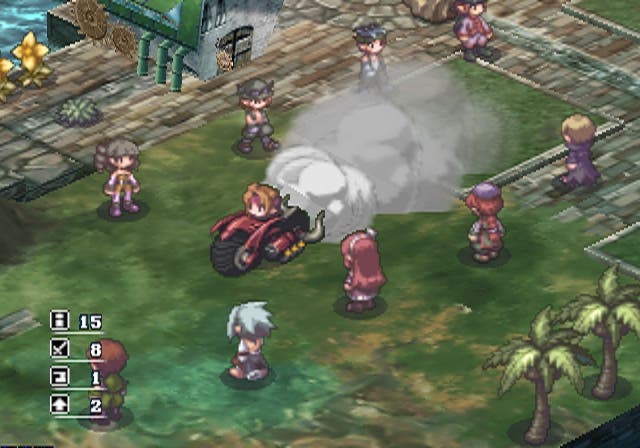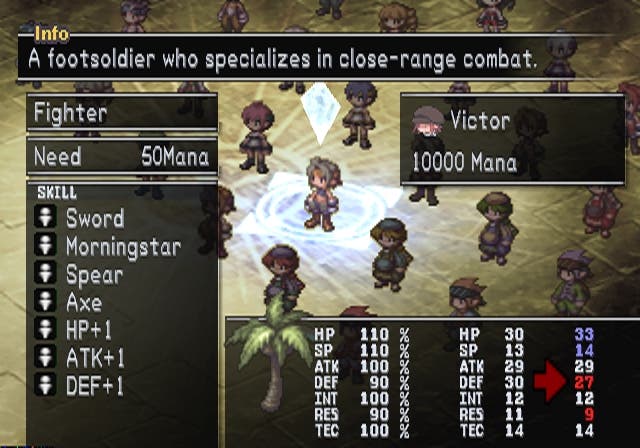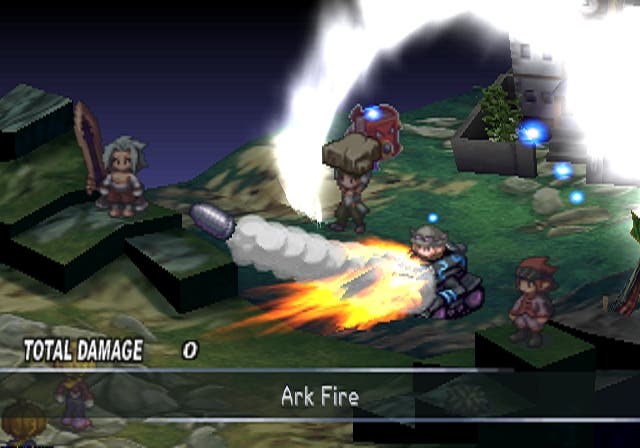Makai Kingdom: Chronicles of the Sacred Tome
Tome to you.
The strategy RPG genre is often thought of as one of videogaming's dark and dusty side streets, where people lurk for a reason that nobody on the cobbles of action and driving beyond truly understands any more.
Videogaming's closest equivalent to chess, strategy RPGs look simple on the surface but have vast, complex, number-crunching underbellies. They addict players into agonising and obsessing for hours over the hit-points and manoeuvres of tiny sprites: weighing each of the precious character's moves with a care and precision scarcely seen elsewhere.
But not really on our TVs. But for a few fringe titles like Future Tactics, and Nintendo's burgeoning interest in transferring its successes to the Cube, it's rare that we get them on things like the PS2. Where once our TVs were abuzz with the likes of Shining Force (SEGA), Ogre Battle (Atlus) and their ilk, modern gamers have been enticed away by the promise of bigger, bolder and better graphics, wooed by the FMV sequences of 32-bit RPGs and then caught up in the relentless, vacuous quest for realism. As have the devs, who left the visually ageing simplicity of these wide, expansive math puzzles to embrace polygons and third-person cameras. Where SRPGs used to thrive on 8- and 16-bit home formats (and 32- if you count Square's efforts, which we'd be foolish not to), they now seem to enjoy the best of us on Nintendo's handhelds.
But not in every case. Back in 2003, a tiny start-up Japanese codeshop, previously known for a niche musical RPG (Rhapsody), released an odd-looking strategy RPG that somehow managed to make it from Japan to America. Nippon Ichi's Disgaea packed so much charm, humour, flair and wonder that the western videogame world slowly turned its fickle head back to strategy RPGs, took a long hard look and realised the mistake it had made. Eventually, it even came out over here - as part of a distribution relationship between Nippon Ichi and KOEI, which has now brought us Makai Kingdom.
MK is Disgaea's grandson, and bears all the family likenesses: deep, complicated but accessible strategy, infinitely customisable characters and a laugh-out-loud funny script all mixed in with a few of its own inventions. Indeed, the game combines some of the best elements of its forebears in an attempt to produce the definitive remix of the Nippon Ichi core strategy engine.

But the best engine in the world is no fun unless the bodywork is up to scratch. As with all Nippon Ichi's crazed-eyed scenarios, the back-story casing to Makai Kingdom is as outlandish as it is bombastic and ensures that you keep playing where other plot lines might leave you bored. True to form, the game is set in and around the 'Netherworld'. In a horribly failed metaphysical experiment to destroy a sacred tome that prophesies his annihilation, Lord Zetta, the ruler of hell, inadvertently destroys himself and, in doing so, fulfils the prophecy. Before he expires he just manages to put his soul into the self-same book ensuring he can continue to exist, if only as a sacred manuscript.
Bear with it.
Lord Zetta isn't the only Netherworld overlord. In fact, there are numerous universes each with their own hellish master and, throughout the game, a whole host of them enter the fray to either offer their support to Lord Zetta in his efforts to restore his power over his netherworld or attempt to move in on his territory.
You are cast as Lord Zetta himself and, through the help of some of these colourful overlords, have to build an army of followers to help you reclaim the netherworld as your own. When we say build an army of followers that is exactly what we mean because, unlike in your standard RPG setting, you are not gifted with a team of pre-packaged characters. Rather, you have to create the soldiers, thieves, healers and magicians that will comprise your crack squad of fighters by creating them from objects you find in each Netherworld.

Each of the objects has its own bonuses (e.g. making a soldier from a rock will grant him high defence) and so there is a certain amount of strategy in choosing which class of fighter you create for each object. As you level up the characters you begin to unlock more classes. Eventually you can even reincarnate your favourite characters into a new class altogether, where they start again from level one but with all the abilities they obtained in their earlier form. So as you progress deep into the game your characters become Swiss-army knives of skills and abilities and their make-up is uniquely yours.
For anyone yet to play a strategy RPG, the flow of play is fairly straightforward. You're treated to a cut-scene followed by a battle on a static, usually small, map. Traditionally these maps are divided up into squares like a chessboard, onto which you deploy and move your troops move by move as you attack the enemy units with a mixture of brute force and magic.
However, in Nippon Ichi's last game, Phantom Brave, they did away with the grid system instead allowing you to position units anywhere you wanted on the map within their movement allowance. This added a gameplay element of weapon and spell distance and made the whole thing a little less like a board game. Makai Kingdom continues this development but traditionalists will probably favour the old grid based system as this, ironically, allowed for far more precision in targeting attacks. Now you can have a huddle of fighters all within a virtual metre-square of each other often resulting in you attacking the wrong person.

There is a wonderful line up of inventive weaponry at your disposal as you work through the game mixing up the ancient (broadswords and axes) with the modern (rocket launchers and tanks) in a delightfully anachronistic tussle. The more your characters use these weapons, the higher their skill becomes in turn unlocking bigger and better attacks.
Another new addition is the ability to create vehicles and facilities to take out into battle. Facilities can be used to store units to have them deployed onto the field and even have their own effects on the battlefield, like HP regeneration, defence or attack bonuses or even experience bonuses.
The system is a lot freer than Disgaea, which, although allowed a lot of customisation, still guided you down a set path. Makai Kingdom by contrast give you full responsibility of every facet of your team and, for many gamers not used to strategy RPGs, it will seem extremely confusing and frightening. It's too open, requires too much understanding and knowledge of Nippon Ichi's previous games to welcome new players in, and is another example of why the strategy RPG genre will likely remain a niche area.
However, for genre fans, the educated, the talented or the time-rich, Makai Kingdom represents a rich and deep pasture with almost limitless ways to play. It's clever, expansive, funny, well made and beautifully translated and, if you are committed enough, could be one of the best videogame investments you'll ever make.

